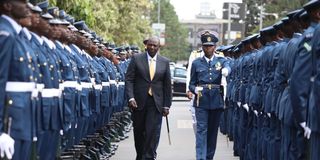Motivate more Kenyans to pay taxes

What you need to know:
- To increase tax collection, Ruto’s government should widen the tax bracket to include all in the formal and informal sectors.
- Ruto should live by his word that he will cut unnecessary government spending.
- It makes no sense for Kenyans to pay taxes only to see huge government delegations going abroad for official trips.
President William Ruto’s call that all Kenyans should be tax-compliant is timely.
According to the President, the government collects Sh2 trillion and is targeting Sh3 trillion by next year. This is an achievable dream.
Taxes in Kenya are categorised into direct and indirect taxes. Indirect taxes are made during the purchase of goods.
Custom duty and Value Added Tax (VAT) fall under indirect taxes, while income tax falls under direct tax.
According to a World Bank report published in October 2018, the poorest 40 per cent of Kenya contribute to 14.3 per cent of market income, but less than 1 per cent of direct income.
On the contrary, 80 per cent of the tax is by the richest 10 per cent of the population. This is partly because there is less formal employment among the poor in the country.
To increase tax collection, Ruto’s government should widen the tax bracket to include all in the formal and informal sectors.
Some workers in the informal sector earn more than employees in the formal sector. In cities, a mason earns Sh1,200 per day. If he works 26 days a month, the mason earns over Sh31,000 and should be eligible for taxation.
Public goodwill
For Ruto’s government to convince Kenyan taxpayers to faithfully remit their taxes, there is a need for public servants to be faithful to Chapter 6 of the Constitution to earn public goodwill.
During the first tenure of President Kibaki’s government, Kenyans had goodwill for the government.
But a few months into Kibaki’s reign, events like the Anglo Leasing scandal saw Kenyans lose faith in fighting corruption.
Similarly, there was hope for better days with the first 100 days of Dr Ruto's reign, but the appointment of some Cabinet Secretaries with suspected integrity issues has dwindled that hope.
President Kibaki succeeded in meeting tax targets. He cut government expenditures and reduced borrowing.
Ruto should live by his word that he will cut unnecessary government spending. It makes no sense for Kenyans to pay taxes only to see huge government delegations going abroad for official trips.
The Ruto government should have spared Kenyan taxpayers the burden of funding another by-election if some elected MPs and a Senator were not appointed to the Cabinet.
With our debt soaring high, the money to fund the by-elections would have serviced our external debts.
President Ruto, like President Kibaki, has to make decisions that are politically suicidal, but economically beneficial to the country.
For instance, President Kibaki had to send home over 400 procurement officers to clean up the National Treasury and other government offices.
After all, is said and done, all Kenyans who are eligible by law to pay tax should remember that faithful remitting of taxes coupled with an accountable government will catapult Kenya into an economic giant.
Martin Olando, Mombasa




